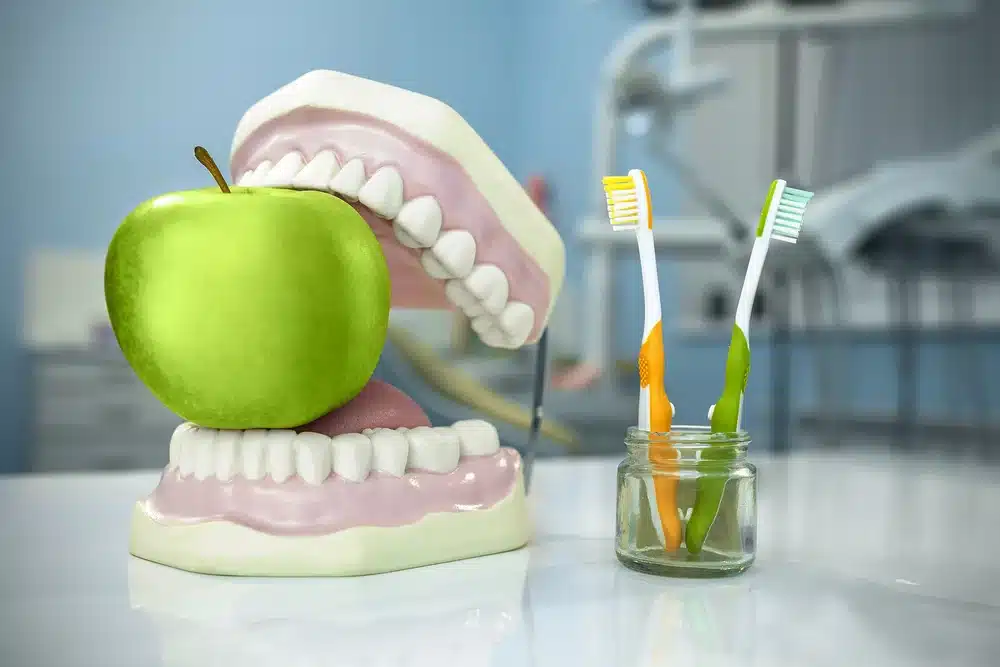Eating with Dentures: Tips and Tricks for Enjoying Your Favorite Foods

Transitioning to dentures can be a significant adjustment, particularly when it comes to eating. Many people worry about how dentures will impact their ability to enjoy their favorite foods. With the right approach and some practical tips, you can continue to savor a varied and satisfying diet. This blog provides guidance on eating with dentures, ensuring you maintain a healthy and enjoyable eating experience.
Understanding Dentures
Dentures are removable dental appliances that replace missing teeth and surrounding tissues. They come in two main types: complete dentures, for those who have lost all their teeth, and partial dentures, for those with some natural teeth remaining. Modern dentures are designed to fit comfortably and function effectively, but they do require some time to get used to.
Tips for Eating with New Dentures
Start with Soft Foods
When you first get dentures, your gums and jaw may need time to adjust. Begin with soft foods that are easy to chew and do not require much biting force. Good options include mashed potatoes, yogurt, applesauce, scrambled eggs, and cooked cereals. Gradually introduce more textured foods as you become more comfortable.
Cut Food into Smaller Pieces
Cutting food into smaller, manageable pieces makes it easier to chew and reduces the risk of dislodging your dentures. It also helps distribute the chewing pressure more evenly across your gums.
Chew Slowly and Evenly
Chew food slowly and on both sides of your mouth to maintain balance and prevent your dentures from shifting. This method also helps you better control the food and aids in digestion.
Avoid Sticky or Hard Foods
Sticky foods like caramel and chewing gum can adhere to dentures, making them difficult to clean. Hard foods like nuts, hard candies, and tough meats can cause discomfort or damage your dentures. Opt for softer alternatives whenever possible.
Use Dental Adhesive
Dental adhesives can provide additional stability and prevent dentures from slipping while you eat. Follow the product instructions and use only as much adhesive as needed to secure your dentures.
Techniques for Eating Specific Foods
Meats and Proteins
Cook meats until tender and cut them into small, bite-sized pieces. Ground meats, fish, and poultry are often easier to manage than tougher cuts. Moist cooking methods like braising or slow-cooking can help make meats more manageable.
Fruits and Vegetables
Steamed or cooked vegetables are easier to chew than raw ones. If you enjoy raw vegetables, opt for softer varieties like cucumbers, tomatoes, and avocados. For fruits, choose ripe options that are naturally softer, such as bananas, berries, and melons.
Breads and Grains
Select breads with a softer crust and avoid those that are overly crusty or hard. Whole grain options can be nutritious and easier to chew. When eating sandwiches, cut them into smaller sections for easier handling.
Nuts and Seeds
If you enjoy nuts and seeds, consider nut butters or finely chopped versions mixed into other foods. This way, you can still benefit from their nutritional value without the challenge of chewing them whole.
Maintaining Oral Hygiene with Dentures
Proper oral hygiene is essential for keeping your dentures and mouth healthy. Follow these guidelines:
Clean Dentures Daily
Remove and rinse your dentures after eating to eliminate food particles and prevent staining. Brush them daily with a denture cleaner to remove plaque and food deposits. Avoid using regular toothpaste, as it can be too abrasive.
Soak Dentures Overnight
Soak your dentures in a mild denture-cleaning solution or plain water overnight. This helps maintain their shape and keeps them free from bacteria.
Brush Your Gums and Tongue
Brush your gums, tongue, and the roof of your mouth with a soft-bristled toothbrush every morning before inserting your dentures. This stimulates circulation and removes plaque.
Regular Dental Check-Ups
Visit your dentist regularly for check-ups and professional cleanings. Your dentist can monitor the fit of your dentures, make adjustments if necessary, and ensure your oral health remains optimal.
Local Considerations
Residents of Edmonton, Canada, should be aware of the local dietary habits and resources available to them. Edmonton offers a variety of fresh produce, meats, and other foods that can be incorporated into a denture-friendly diet. Local dental services, like those provided by Dr. Molly Rodgers Dental, are equipped to offer personalized care and advice for managing dentures.
Conclusion
Eating with dentures can be a smooth and enjoyable experience with the right techniques and habits. By starting with soft foods, cutting food into smaller pieces, and chewing slowly, you can gradually return to a varied diet. Proper denture care and regular dental visits are also crucial for maintaining oral health and ensuring the longevity of your dentures.
About Dr. Molly Rodgers Dental
Dr. Molly Rodgers Dental, located in Edmonton, Canada, offers comprehensive dental care, including denture services. The experienced team at Dr. Molly Rodgers Dental is dedicated to helping patients adjust to and maintain their dentures. With personalized care and advanced dental solutions, Dr. Molly Rodgers and her team ensure that you can enjoy your favorite foods and maintain a healthy smile. Schedule a consultation today to learn more about how to care for your dentures and enjoy eating with confidence.
